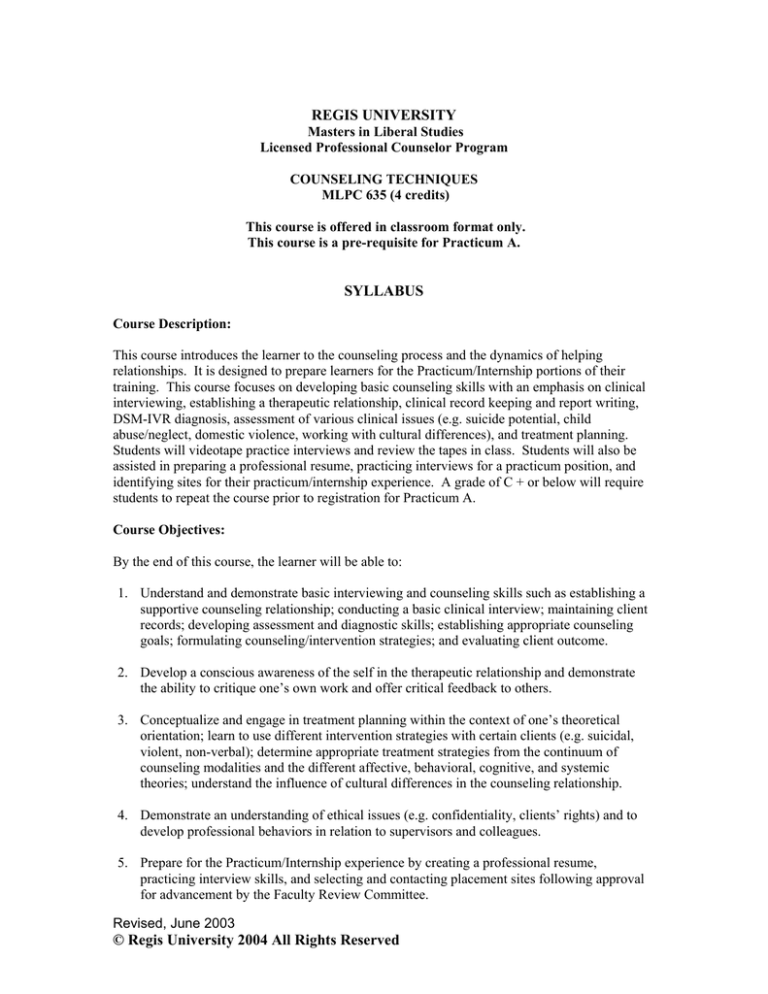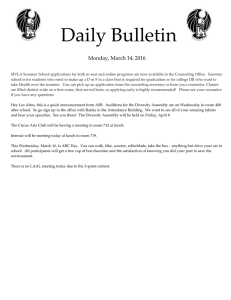
REGIS UNIVERSITY
Masters in Liberal Studies
Licensed Professional Counselor Program
COUNSELING TECHNIQUES
MLPC 635 (4 credits)
This course is offered in classroom format only.
This course is a pre-requisite for Practicum A.
SYLLABUS
Course Description:
This course introduces the learner to the counseling process and the dynamics of helping
relationships. It is designed to prepare learners for the Practicum/Internship portions of their
training. This course focuses on developing basic counseling skills with an emphasis on clinical
interviewing, establishing a therapeutic relationship, clinical record keeping and report writing,
DSM-IVR diagnosis, assessment of various clinical issues (e.g. suicide potential, child
abuse/neglect, domestic violence, working with cultural differences), and treatment planning.
Students will videotape practice interviews and review the tapes in class. Students will also be
assisted in preparing a professional resume, practicing interviews for a practicum position, and
identifying sites for their practicum/internship experience. A grade of C + or below will require
students to repeat the course prior to registration for Practicum A.
Course Objectives:
By the end of this course, the learner will be able to:
1. Understand and demonstrate basic interviewing and counseling skills such as establishing a
supportive counseling relationship; conducting a basic clinical interview; maintaining client
records; developing assessment and diagnostic skills; establishing appropriate counseling
goals; formulating counseling/intervention strategies; and evaluating client outcome.
2. Develop a conscious awareness of the self in the therapeutic relationship and demonstrate
the ability to critique one’s own work and offer critical feedback to others.
3. Conceptualize and engage in treatment planning within the context of one’s theoretical
orientation; learn to use different intervention strategies with certain clients (e.g. suicidal,
violent, non-verbal); determine appropriate treatment strategies from the continuum of
counseling modalities and the different affective, behavioral, cognitive, and systemic
theories; understand the influence of cultural differences in the counseling relationship.
4. Demonstrate an understanding of ethical issues (e.g. confidentiality, clients’ rights) and to
develop professional behaviors in relation to supervisors and colleagues.
5. Prepare for the Practicum/Internship experience by creating a professional resume,
practicing interview skills, and selecting and contacting placement sites following approval
for advancement by the Faculty Review Committee.
Revised, June 2003
© Regis University 2004 All Rights Reserved
Textbooks and Materials:
Faiver, C., Eisengart, S., & Colonna, R. (2000). The counselor intern's handbook (2nd ed.).
Pacific Grove, CA: Brooks/Cole (Thomson Learning). Companion website:
http://www.wadsworth.com.
Martin, D. G. (1999). Counseling and therapy skills (2nd ed.). Waveland Press.
Moursund, J., & Kenny, M. C. (2001). Process of counseling and treatment (4th ed.). Prentice
Hall.
Zuckerman, E. L. (2000). Clinician's thesaurus: The guidebook for writing psychological reports
(5th ed.). New York: The Guilford Press.
Selected articles/information packet distributed in class.
PLEASE NOTE: You will also need to provide three 90 minute blank VHS tapes for use
during the course.
Reference/Bibliography:
Cormier, Sherry & Cormier, Bill (1998). Interviewing strategies for helpers: Fundamental skills
and cognitive behavioral interventions. Pacific Grove, CA.: Brooks/Cole.
Eagen, Gerard. (1997). The skilled helper: A problem-solving management approach to helping.
Pacific Grove, CA: Brooks/Cole.
Greenspan, Stanley & Greenspan, Nancy. (1991). The clinical interview of the child. Washington
D.C.: American Psychiatric Press.
Cormier, S. & Hackney, H. (2004). Counseling strategies and interventions (6th ed.). Needham
Heights, MA: Allyn & Bacon ISBN: 0-205-37052-7
Kottler, Jeffrey. (1995). Growing a therapist. New York: Jossey-Bass.
Lukas, Susan (1993). Where to start and what to ask: An assessment handbook. New York:
W.W. Norton & Co., Inc.
May, Rollo. (1990). The art of counseling (revised edition). Klamath Falls, OR: Gardner.
Morrison, James. (1995). The first interview. New York: Guilford.
Pedersen, Paul & Ivey, Allen. (1997). Culture-centered counseling interventions: Striving for
accuracy. New York: Sage.
Seligman, Linda (1998). Selecting effective treatments: A comprehensive systematic guide for
treatment of mental disorders. New York: Jossey-Bass Publishers.
Thompson, Rosemary A. (1996). Counseling techniques: Improving relationships with others,
ourselves, our families and our environment. Philadelphia, PA: Taylor & Francis.
Learning Activities:
1. Basic Counseling Skills: This activity requires the learner to demonstrate an understanding
of and ability to establish a therapeutic alliance and build rapport. Working with another
learner, each student will complete one 20 minute videotape. In the session, the learner will
demonstrate basic listening skills and attending behaviors, restatement of concerns and issues,
and recognition of professional boundaries.
2. Initial Interview: This activity requires the learner to demonstrate an understanding of and
ability to complete an initial interview with a client. Working with another learner, students
will complete a 50-minute videotape demonstrating their ability to establish a therapeutic
relationship, gather information for the psychosocial history and conduct a mental status
examination. Learners will begin the session by building rapport and proceed through
information gathering, clarification of concerns and issues and terminating the session. The
session should be uninterrupted and genuine (for example, if the learner makes a mistake,
they simply continue with the session).
3. Maintaining Client Records: This activity requires the learner to demonstrate an
understanding of and ability to appropriately document interactions with clients. Learners
will view in class a portion of videotape of a counseling session and will complete an entry
for the client’s file that summarizes the session.
4. Assessment and Diagnostic Skills: This activity requires the learner to demonstrate clinical
skills in completing a multi-axial diagnosis of a client. The facilitator will role play a client,
and will be interviewed by learners to obtain appropriate information. Learners will then
complete a multi-axial diagnosis.
5. Treatment Planning: This activity requires the learner to demonstrate skills in completing a
treatment plan that is appropriate to the client’s presenting problem. The facilitator will role
play a client, and learners will complete a treatment plan and recommendations.
6. Ethical Issues: This activity requires learners to demonstrate an understanding of ethical
issues and to apply that understanding in practice. Learners will be given case vignettes in
class involving a variety of ethical issues. Based on each vignette, learners will write a
1-page paper identifying the issues and outlining appropriate counselor responses to those
issues based on the ACA Code of Ethics.
7. Resume and Interview Skills: This activity requires learners to prepare a resume appropriate
for use in seeking a practicum/internship position. Assistance in resume preparation can be
obtained at www.regis.edu/careerservices. Learners will arrange for a mock interview at the
Regis Career Services office (303-458-3508) and complete a video-taped interview with a
Career Services Counselor. Learners need to take a blank videotape to the interview.
Learners will submit the tape and a copy of their resume to the class facilitator.
8. Counselor Self-Assessment: This activity requires learners to explore their role as a
professional. Learners will complete the Counselor Self-Assessment, “Who Am I As A
Professional” questions on pages 111-112 in the Counselor Intern’s Handbook (Faiver,
Eisengart & Colonna, 1995) and turn this in to the class facilitator.
Bases for Evaluation:
1. Basic Counseling Skills – videotape (20 min)
2. Initial Interview – videotape (50 min)
3. Maintaining Client Records
4. Assessment and Diagnostic Skills
5. Treatment Planning
6. Ethical Issues
7. Resume/Interview Skills
8. Counselor Self-Assessment
90-100 pts. = A
80-89 pts. = B
70-79 pts. = C
15%
30%
5%
5%
5%
10%
5%
25%
<69 pts. = F
All learning activities must be successfully completed in order to complete the course with a
grade of B or above. For example, you earn grades of A on activities 1 through 7, but do
not complete activity 8, your grade for the course would be a C. Any grade lower than a Bwill require you to repeat the Techniques course before beginning Practicum.
All assignments must be submitted by due dates. Any work delivered after those dates will be
penalized one full letter grade. For example, you earn a grade of A but the assignment is
submitted after the due date, your grade for the assignment will be a B.
Course Calendar, Readings and Assignments:
Week 1: Review of syllabus and general overview of class
Creation of small groups (throughout the semester, you will work in a small group of
3 - 4 and rotate the roles of counselor, client and observers).
Discussion of the counseling process and role of counselor: what is a therapeutic
conversation, what defines a therapeutic relationship, role of a counseling
orientation, differences in counseling orientations, the politics of counseling.
Issues in the Counseling relationship: confidentiality, informed consent, voluntary vs.
involuntary clients, supervision and consultation.
Readings: Faiver, et al; Chapter 4, pp. 26-44
Moursund, Chapters 1 & 2, pp. 1-36
Martin, Chapters 1 & 2, pp. 3-29
Handouts
Week 2: Basic counseling skills: Attending and communicating, creating a therapeutic
environment, basic empathy, the art of listening, verbal and non-verbal
communication.
Client record management: Documentation in counseling practice, standards for case
records, progress note formats, recording the initial interview, what “does and
doesn’t” go into case notes.
Supervision: the role of a clinical supervisor, preparation for supervision, requirements
for supervision in Practicum and Internship.
Videotape of Basic Counseling Skills (20 minutes)
Readings:
Favier,et al Chapter 5 pp.45-52
Moursund, Chapters 3 & 4, pp. 37-74
Martin,Chapters 3, 4, & 5, pp. 31-90
Handouts
Week 3: Initial client interview: establishing rapport, describing the context and process of
counseling to the client, taking notes, obtaining basic biopsychosocial
information, dealing with resistance, ending a session.
Mental Status Exam: the need for a mental status evaluation, “red flags” in the exam.
Diagnostic interviewing: using the DSM-IVR, multiaxial diagnosis, guidelines for
diagnosis, alternatives to the DSM-IVR.
Treatment planning: defining issues, developing strategies for intervention,
establishing therapeutic goals
Readings: Favier, et al; Chapter 8, pp. 83-109
Moursund, Chapter 7, pp. 122-147
Martin, Chapter 6, pp. 91-117
Handouts
Week 4: Ethics and professional responsibility: standards of practice, professional boundaries,
dual relationships, disclosure and informed consent. Several case vignettes will
be used to clarify and discuss issues.
Special issues with clients: assessment of suicidal ideation, domestic violence, child
abuse and neglect, agitated and aggressive clients, non-verbal clients, crisis
intervention.
Facilitator role play of client: Learners will complete a psychosocial assessment,
mental status exam and initial interview. Information from the role play will be
used to develop a multiaxial diagnosis and preliminary treatment plan.
Reading: Moursund, Chapter 5, pp. 75-98
Martin, Chapter 9, pp. 175-196
Week 5: The middle phase of counseling: the process of empowerment, therapeutic change,
transference and counter-transference, counseling orientation and evaluation of
progress, dealing with resistance in the middle phases of counseling.
The final phase of counseling: ending the counseling relationship, evaluating goals, the
role of family and community resources.
Videotaping of Initial Interviews (50 minutes): Learners will meet in small group
with one designated as the client, one as the counselor and one or two observers.
After completing the 50 minute tape, the learner will review their role as
counselor and choose a 20 minute segment to present to the class for
discussion.
Complete the Resume and Interview Skills activity
Readings: Favier et al; Chapter 10, pp. 114-123
Moursund, Chapter 6, 8, 9 & 10, pp. 99-121 & 148-237
Martin, Chapter 12 & 14-17, pp. 217-224 & 235-279
Week 6: Working with families, couples and groups: the role of the counselor in family and
group counseling, issues of confidentiality & ethical concerns.
Complete the Assessment and Diagnostic Skills and Treatment Planning activity
(based on role play)
Videotaping of initial interview (continued)
Readings: Faiver, et al. Chapters 1, 2 & 3, pp. 1-25; Appendix A, p. 127
Week 7: Review of Initial Interview videotapes: Students will present a 20 minute segment of
their 50 minute tape for review and discussion with the class.
Week 8: Preparing for Practicum and Internship: commonly asked questions, preparing for
interviews, choosing sites
Meeting with site supervisors: several supervisors from training sites will answer
questions and share information about their agency.
Becoming a counselor: establishing a professional identity, involvement in ACA and
other professional groups, basic “do’s & don’ts.”
ALL ASSIGNMENTS DUE


